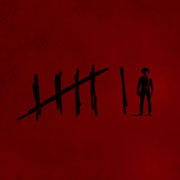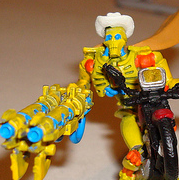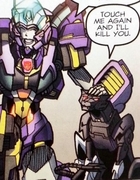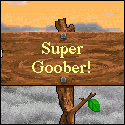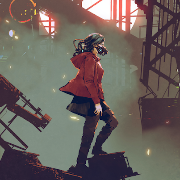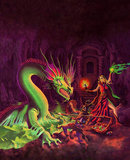|
Wapole Languray posted:Nope, just the first and most prominent avatar of the Naked Goddess is a transwoman former FBI agent. And the Mystic Hermaphrodite got a namechange: It's now called the Sexual Rebis, because Stolze realized the old one is sorta offensive. "Sexual Rebis" is a better name in every way though I think "the Rebis" would be better still.
|
|
|
|

|
| # ? Apr 19, 2024 01:16 |
Wapole Languray posted:Nope, just the first and most prominent avatar of the Naked Goddess is a transwoman former FBI agent. And the Mystic Hermaphrodite got a namechange: It's now called the Sexual Rebis, because Stolze realized the old one is sorta offensive.
|
|
|
|
Zereth posted:... wait, how can any avatar of the Naked Goddess be "prominent"
|
|
|
|
|
Nessus posted:To hypothetical people sitting in their lovely apartments with conspiracy walls, I assume. That seems like the target audience.
|
|
|
|
Also to any dude with a quasi-sexual fixation on a particular woman whom he does not see as a person, I imagine. Which is not a small demographic, unfortunately.
|
|
|
|
This game seems to be based around in the inner narratives of people getting into fights in the parking lot of a 7/11.
|
|
|
|
Joe Slowboat posted:Also to any dude with a quasi-sexual fixation on a particular woman whom he does not see as a person, I imagine. Which is not a small demographic, unfortunately. Enough to make an archetype, surely. The Total Creep. The Incel. The Self-Made Loser.
|
|
|
|
Ghost Leviathan posted:This game seems to be based around in the inner narratives of people getting into fights in the parking lot of a 7/11. UA does not imagine the secret world of the Occult to be glamorous at all.
|
|
|
|
Since my only experience with UA are the F&F write ups I have to ask if it's actually any fun at all to play? Because everything I read about it sounds like the opposite of what I'd want to deal with in a game. (admittedly that could just be my taste in games.)
|
|
|
|
Mors Rattus posted:UA does not imagine the secret world of the Occult to be glamorous at all. This is what happens when one of the world's foremost magical conspiracies is based outside of McDonald's.
|
|
|
|
8one6 posted:Since my only experience with UA are the F&F write ups I have to ask if it's actually any fun at all to play? Because everything I read about it sounds like the opposite of what I'd want to deal with in a game. (admittedly that could just be my taste in games.) Well, if you're getting the impression that player characters in UA are mostly going to be kind of miserable people, you're not wrong. Whether that means you as a player will find it miserable is something you can probably judge better than we can.
|
|
|
|
Ghost Leviathan posted:This game seems to be based around in the inner narratives of people getting into fights in the parking lot of a 7/11. Just wait until we reach the Adepts, the Avatars have their heads screwed on tight in comparison. EDIT: UA is of the opinion that seeking and gaining occult power not only doesn't necessarily make you more successful in 'real' life but that the pursuit can be actually an active detriment to it. It actually reminds me a little of the vibe from Cultist Simulator, where you play a seeker of enlightenment and immortality and the truth behind the world etc etc...who most likely has a really lovely job and no non-occult friends. If you already had material power, why would you be so desperate to seek the immaterial? ZeroCount fucked around with this message at 13:55 on Aug 15, 2018 |
|
|
|
7th Sea 2: The Crescent Empire - Devotion Is Magic It is said that in the desert, Elohah appeared to Abram and Saraya, teaching them the ways of peace and guardianship. In their conversations, Elohah promised the pair that as long as they kept their promises to Him, He would keep His promises to them. These twelve promises of Elohah are the foundation of Chozeh, the sorcery of Sarmion. The promises are passed down to its users in the form of a poem that, tradition claims, is Elohah's own words as recorded by Saraya. Twelve Promises posted:All are my people and wondrous to me. Since the time of King Solomon, however, no official copy of this poem is complete. Solomon saw the dangers in the final three promises, not contained in the poem above, and he ordered their knowledge forbidden to all but the worthy. However, even the mighty King Solomon could not purge the lines from memory, and so some families pass down the complete poem. This allows the lost powers to occasionally resurface. Based on tales and these events, the final promises granted the power of actively perceiving the future, granting life to the inanimate and binding gods and other spirits that were not of Elohah. When someone begins to learn Chozeh, they spend time in prayer or contemplation. Only in true understanding can the power of the promises be accessed. Once understanding is achieved, the practitioner may call one of the three sets of promises, known as the Marvels, the Revelations and the Protections. These promises are then distilled to a single Dibre word, which is inscribed either on an amulet or on the body, to be later activated in order to access the power. The stanza containing the forbidden Promises is known as the Lost. To learn Chozeh, you must devote yourself to understanding one of the stanzas - generally not the Lost, because you probably don't know that one. Once you choose a stanza, you must meditate on its meaning and perform an act of charity based on its promises for others without the use of magic. This reinforces the purpose and importance of each promise, to ensure you understand them. For Sorcery taken during chargen, it is assumed these have already been performed; for later purchases, you must take these actions as part of the Story. The Marvels might see you delivering messages for others or helping build bridges, the Revelations might have you organizing the thoughts of others or convincing people of their own worth, and the Protections might involve granting hospitality to strangers or guiding the lost. The first time you purchase Sorcery (Chozeh), you learn two Amulets from the same Stanza, and one Script for the same word as one of your Amulets. Every time after the first, you either learn one Amulet and one Script (which you must have the Amulet for) or one Tattoo (which you have the Script for). You must complete all Amulets and Scripts in a Stanza before you can start learning those of a different Stanza. Tattoos can be learned any time and are not required. To use the power, you must first create the Amulet, Script or Tattoo, then activate it. Amulets typically take the form of a small clay or wood pendant inscribed with your promise's keyword. Once used, it crumbles to ash and dust. A Script is written on your flesh in ink, ash, blood, mud or other temporary substance that leaves marks. Once it is activated, the word disappears. You may no grant use of your Amulets or Scripts to others, and no one but you can destroy your Amulets and Scripts. You begin every Scene with one Amulet or Script prepared for each purchase of Sorcery you have, chosen when you activate them. After that, you need to make more. On your turn, you may spend a Hero Point to create an Amulet or Script, and can make any Amulet or Script you know, but have to choose which one it is when you make it. Created Amulets and Scripts lose their power after 24 hours. Tattoos are permanent and give ready access to a promise's power, but they have some social taboos - many religious groups in Sarmion believe tattoos are taboo, especially those that, like these sorcerous ones, alter more than the skin. Creating a Tattoo is involved. First, you need to tattoo the keyword onto an arm or leg, in as ornate or basic a design as you like. Once that's there, you must activate it for the first time via prayer, song or will. This binds it to you and fundamentally alters your body, causing one Dramatic Wound. Once an Amulet, Script or Tattoo exists, you have to activate it. To activate an Amulet or Script, you recite the keyword and the phrase 'this is my promise.' Outside of a Sequence, this can be done freely, and any lasting effect remains until a Scene begins. In a Sequence, it costs one Raise to do. Amulets typically have an immediate or short-term effect, while Scripts have a more potent and longer one. Tattoos are activated similarly, but they cost a Hero Point to activate. Once they are active, you may freely invoke the Amulet or Script associated with that keyword. However, while a Tattoo is active, using other Amulets or Scripts costs 2 Wounds, not a Raise. You may have only one Tattoo active at a time. Further, Chozeh is a covenant. You have three promises you must keep in order to use it properly, which is what powers the magic. These are: 1. Promote Peace. Chozeh ends conflicts, it does not perpetuate them. 2. Help Others. Chozeh strengthens you to strengthen the people. 3. Self-Defense. Chozeh is about survival, not sacrifice. If you use a Chozeh keyword to break one or more of these promises, your connection to it is weakened. You may still use powers from that word, but each activation causes you to gain 1 Corruption. There doesn't appear to be any way to atone for this, but I'd say that a Redemption Story could probably fix it. And yes, these powers are used by Sarmions that are not Yachidi. To a Sarmion, true knowledge of divinity comes from learning and working with your brothers, even if you are not of their faith. Chozeh was made to protect Sarmion, not just the Yachidi. Marvels Koach is the promise of strength, to open doors that are locked, to hold back attackers, to build homes and burn prisons. Amulet: For the rest of the round, you do not pay Improvisation costs for any action using Brawn. Script: Your muscles and joints warp and strengthen. You get 2 Bonus Dice to all Brawn Risks for the rest of the Scene, which applies retroactively - if your Approach was Brawn-based, immediately roll 2 more dice and add the result to your Raises. Mahir is the promise of speed, to act before bad things can happen, to pull others to safety, to carry messages of truth. Amulet: You may take one action immediately without spending a Raise, even if it isn't your turn. If this would cost multiple Raises, you must pay the extra Raises when you do the action. Script: Your body and mind warp and speed up, such that the world seems to slow around you. You get 2 Bonus Dice to all Finesse Risks for the rest of the Scene, which applies retroactively - if your Approach was Finesse-based, immediately roll 2 more dice and add the result to your Raises. Amidah is the promise of endurance, to withstand any disaster, to endure any attack without falling. Amulet: You are wrapped in protective light, preventing the next 3 Wounds you would take. Script: Your skin warps and hardens, and your pain tolerance increases. Any time you would take wounds for the rest of the Scene, you take 1 fewer Wound, to a minimum of 1. Revelations Yad is the promise of clear senses, to take in the beauty of the world or to shut it out entirely. Amulet: One of your senses (you choose which) is warped and inhumanly heightened far beyond normal capacity for the rest of the Scene. Script: Your senses fall under your conscious control, allowing you to block out stimuli to better focus. You are immune to Fear and Pressure for the rest of the Scene. Daath is the promise of clear mind, to tap into the unorganized knowledge within and bring all mental resources under your control. Amulet: Ask the GM three yes/no questions concerning knowledge your character either has or arguably could have. This is not divination, and you must ask all three questions at once. Script: Your mind warps and sharpens, allowing you to pull in and synthesize all the information present. You may ask the GM (Notice) questions about the current Scene, and may save these questions to be asked at any time in the Scene. Lebab is the promise of clear heart, to free yourself from self-hatred and uncertainty, to calm yourself and see the truth. Amulet: You become able to sense the hearts of others. Choose one other character in the Scene. For the rest of the Scene, when they lie or purposefully mislead you, you know. You don't know the truth or their motives, but do know they are being dishonest. Script: Your self-doubt fades away entirely, giving you utter clarity of purpose. For the rest of the Scene, your rolled 9s count as 10s. Protections Nivut is the promise of direction, the granting of purpose when lost, to let you find your way. Amulet: You are drawn to something you can use. Create a free Opportunity, and you may immediately take one action that spends only one Raise. Script: Your direction becomes clear. Ask the GM how to get to a place. As long as you are going the right direction, the Script glows on your body gently. If you mvoe the wrong way, it dims. If you willingly leave the correct path to do something else, even if the distraction is only for a few minutes, the effect ends. Chasah is the promise of refuge, the calm in a storm, the place of safety and protection of others. Amulet: You wrap the amulet around something. Anything so wrapped is hidden until the sun reaches its zenith, rendered entirely invisible, imperceptible and impossible to find. Any attempt to search for it fails, unless someone specifically suspects it is hidden by the amulet or is using magic to search, in which case it still takes 2 Raises to find. Script: Your body warps, becoming able to free you of any bonds or locks. You slip free of any restraints and can open any prison doors. For the rest of the scene, you cannot be locked up or restrained in any way. Rapha is the promise of health, the power to purify and heal, to remove pain from the world. Amulet: You touch the amulet to food or drink, removing all poison and impurity from it. The Amulet may cleanse only one item. Script: Your voice mystically gains the power of healing. Sing, chant or pray over someone that is wounded. They heal 4 Wounds. The Lost Promises do exist; they are studied by scholarly orders sometimes. The keywords have been passed down in certain family lines and spread by rumor. Their full text, however, is extremely disputed. If you wish to use these, you will need their full text so that you can understand their purpose, going on a quest to recover the missing lines. This is a six-Step story. Two steps get you a Sorcery advantage, the other four reveal the lines of the Stanza, at one step per line. Once you finish, you may learn the Lost Promises. They are extremely powerful, and can be learned by anyone that finds your reconstructed stanza or learns it themselves. You must have at least one Stanza fully known before you can make this quest. The Lost Promises are: Nivua, the power of prophecy, which can tear open the veil of the future and draw forth answers. Shlita, the power of dominion, which can bind spirits and even gods, trapping them in the material plane in prisons of clay and stone. Chai, the power of life, which can animate the inanimate and direct it. And yes, there's folks out there that know one or more of these powers, most notably Chai, which was used in defense of Sarmion against the Numanari. They can help you on your quest! You will also note that there are no mechanics for permanently mutating yourself by tapping into the full depths of the sorcery, as various NPCs did in pursuit of the defense of Sarmion. I consider this a great failing of Chozeh's mechanics, which could at least mention the ability but leave it entirely to the GM, as the Lost Promises are. (You may also notice that this shares a distinct mechanical similarity to the magic of Not Egypt. I don't know why; the two are not related in any way in the fluff.) Next time: Wings.
|
|
|
|
I'm curious. Has anyone here actually played UA3e? It feels like another major theme is that all these people don't actually change anything because by the time you're powerful enough to try you're just a whigged out avatar of another lovely cultural phenomena and dragged along by your taboos to the point that you no longer possess independent individual agency. How do you deal with an actual group of people who do this, potentially, in play?
|
|
|
|
Night10194 posted:I'm curious. Has anyone here actually played UA3e? It feels like another major theme is that all these people don't actually change anything because by the time you're powerful enough to try you're just a whigged out avatar of another lovely cultural phenomena and dragged along by your taboos to the point that you no longer possess independent individual agency. I have! Just coming to the end of running a ~year long campaign and it's been a blast. Generally the key with Avatars is that they are only one route to power - when your party also has one or two adepts, and a few more normals, it's not nearly so overwhelming. Also, it's important to note that a lot of the taboos aren't at all crippling. When I played a Demagogue it was perfectly easy to never admit that I was wrong, and it can still lead to some really fun gameplay watching it distort your character's lives.
|
|
|
|
The other thing is you can willingly choose to break taboo - it just drops your Avatar skill level. Avatars are doing this by choice, most of the time, rather than because following the taboo is literally part of their worldview.
|
|
|
|
Night10194 posted:I'm curious. Has anyone here actually played UA3e? It feels like another major theme is that all these people don't actually change anything because by the time you're powerful enough to try you're just a whigged out avatar of another lovely cultural phenomena and dragged along by your taboos to the point that you no longer possess independent individual agency. You can be other things besides Avatars. In addition to the Adepts, some of the most powerful and influential people in the occult underground are completely 'normal' humans because their lack of direct occultism has left them with the capacity to competently function in the modern world without having to consult the Parliament of Banana Peels or whatever. ZeroCount fucked around with this message at 15:47 on Aug 15, 2018 |
|
|
|
And they're (adepts) all still based around being loving insane self destructive messes, right? Otherwise, you're playing the normal cultists who try to keep these people on rails? "What's your role in the organization?" "I was smart enough not to bother with magic and I still have a decent credit rating, so I bankroll things and let the crazy idiots do my work for me." Night10194 fucked around with this message at 15:52 on Aug 15, 2018 |
|
|
|
I remember 2e saying that the prime advantage of being a normal dude is that when you find the Bigge Booke of Uncleane Incantationes, you can just put it down and walk away.
|
|
|
|
An adept is not necessarily self-destructive, but they are all insane, having adopted a worldview entirely off-kilter from reality to such a degree that their obsession enables magic. Their taboo-breaking is a much bigger deal because they lose their charges from it and that basically means they go from 'terrifying lunatic wizard' to 'just a lunatic' in about ten seconds.
|
|
|
|
Night10194 posted:I'm curious. Has anyone here actually played UA3e? It feels like another major theme is that all these people don't actually change anything because by the time you're powerful enough to try you're just a whigged out avatar of another lovely cultural phenomena and dragged along by your taboos to the point that you no longer possess independent individual agency. UA3 is really good about explaining how you are expected to put a party together - it's all about the creation of your occult group and defining your group's goals and then setting about completing said goals while overcoming whatever obstacles the GM throws in your way. i believe Wapole covered that in one of the first posts, but it definitely bears repeating because the entire section about the players making their characters together and collaborating to define the terms of their occult group is extremely important. someone playing an Avatar or an Adept can certainly steal the spotlight if the GM allows it to happen. the idea is that your group of players would decide up front what type of group they want to run and what their goals are, so accommodating an Adept or Avatar should be baked into the result. off the top of my head, if someone in the group wants to be an Avatar a very easy occult group would involve the rest of the players acting as the Avatar's friends/family/hangers-on that all also want the Avatar to succeed for whatever reason. if every player wants to be a different Avatar and they're unwilling to concede that four people will mutually exclusive goals probably won't work as an adventuring party, the problem isn't with the system. the example in the chapter that discusses character creation and the formation of your group says the same thing "if your group of players can't cooperate and they pick a dumb goal to pursue and don't want to keep playing after the second adventure, don't blame the system because your players are terrible". it is decidedly different from a kitchen sink setting like Forgotten Realms though, where each player can be a one-of-a-kind Drizzt and yet somehow they all come together and have generic adventures slaying dragons. your players have to agree up front to what kind of UA game they want to play or it's not going to be very much fun.
|
|
|
|
One nice touch was was one of the scariest dudes in UA was Eponymous, Alex Able's bodyguard, who was as magical as a dishrag but also a sociopath with special forces training.
|
|
|
|
7th Sea 2: The Crescent Empire - Wings Are Magic Yasnavan holy texts speak of the ahuras, the righteous angels which fight the daeva, the evil demons. This conflict, called the Eternal Struggle, has been going since time began, and the winner will claim dominion over the entire world. These may just be stories, but most Yasnavans believe it, because the angels are real. Khahesh-Ahura means 'on the wings of the angels' and it is the magic that channels the divine spirit of the 12 eldest ahuras in grand displays of power. Its users manifest glorious, angelic wings of power - wings of fire, or shadow, or steel, or many other forms, using them to perform grand actions. They can be stronger or smarter than any normal person, heal from terrible wounds, use divine words to force others to obey, or even fly. While the first user of Khahesh-ahura used her power to overthrow a tyrant, of course, not all modern sorcerers are so honorable. Once the wings have been summoned, the angels don't actually check up on what you do with them. Both great heroes and terrible villains have wielded the magic power of the ahuras. Every user of Khahesh-ahura is empowered with the legacy of one of the primary ahuras of Ahurayasna. The first time you gain Sorcery (Khahesh-ahura), you select one of the ahura whose Legacy you bear. Ahuras can empower as many or as few sorcerers as they choose, and are typically drawn to people who have similar views or traits as they represent. You also select two Legacies, which can either be Common Legacies or Rare, though you can only ever have one Rare Legacy - the one associated with your ahura. Every subsequent purchase gives you two new Legacies, and you may never have any Rare Legacy except your ahura's. You may use any given Legacy only once per Scene, and activating a Legacy always costs a Hero Point and causes your wings to manifest. (Each ahura gives you mystic wings, and the sorcery is extremely unsubtle as a result.) You cannot channel your Legacies without obvious manifestations of angelic power via your wings. There are some who say that Hediyeh, the Lost Angel, who was cast out of the family of archangels for unknown reasons, also grants her power sometimes, and that those who receive it can perform the sorceries without the manifestation of wings. Whether she even exists and how she was cast out is hotly debated, but those who say she can do this refer to her theoretical Khahesh-ahura as the Wingless, and stories do exist about them being around. Anyone who knows how to manifest the wings of Khahesh-ahura can teach others how to do the same. As long as you have Yasnavan lineage somewhere in your family tree, you have the potential to learn the sorcery inside you. However, it is impossible to select or train for a specific ahura. Rather, the first time a new sorcerer summons their wings, the ahura that most closely identifies with them selects them and grants their wings. It is very common for a student to have an entirely different ahura from their teacher. Also, side note: you can manifest your wings at will without spending a Hero Point; this has no mechanical effects, but shows your power and may enable some neat narrative stunts. Note that by default you can't fly with them - that's a particular ability. (Hell, a bunch of them aren't even physical wings, but wings made of nonphysical stuff.) We also get a sidebar saying that people have, in fact, noticed that 'daeva' and 'dievai' sound similar, and that while there is no concrete proof that they are the same entities, several people in the world certainly believe they are. Ahuras Arsalan, Angel of Animals and Judgment is the twin brother of Zharfa. He oversees the life, health and growth of all animals, including humans. It was only by his skill that Vafa was healed after suffering a terrible wound protecting their brother. It is said that Arsalan may heal any wound with a touch, no matter how dire, and those who recover from terrible injuries are said to have been 'Touched by Arsalan.' Khahesh-ahura sorcerers empowered by Arsalan receive the wings of animals. Often these are feathered bird wings, but they can also be those of other beasts, such as bats or insects. Dawna, Angel of Victory, is the eldest of the ahura. She is looked up to by all as a leader, for as long as she commands them in battle, they cannot lose. She was the first to grant her power to a mortal, allowing Ziba the Beloved to cast down and overthrow Azdaha, who was empowered by the evil Namirha. Khahesh-ahura users empowered by Dawna receive wings of glorious, radiant and pure energy, which burst forth from their back and can be blindingly bright to look at directly. Farzaneh, Angel of Vengeance, was the secondborn ahura. She ignored Dawna's warnings, seeking to destroy a potent daeva alone. The daeva was stronger than she, and actually tore the flesh off her wings before sending her fleeing home, a tattered shadow of her former self. Rather than despair, Farzaneh took hold of the rage within her and channeled it into her new purpose - revenge. Khahesh-ahura sorcerers empowered by Farzaneh receive wings of bone. They are the only sorcerers whose wings are painful to manifest, and that pain is severe, as their wings burst forth bloodily from their flesh. (This does no lasting harm - it just hurts like a bitch.) Nazanin, Angel of Time, is the ahura of which fewest stories exist. What is known is that she watches over the prisons of those foes too powerful for even the ahuras to slay. She is a lonely angel, for she may never leave her post, and her only interactions with her brothers and sisters are when they come visit her. Khahesh-ahura users empowered by Nazanin receive wings of ice. They are bitterly cold to the touch, and still, unmoving waters freeze over near them. Omideh, Angel of Hope, is the youngest of the major ahura. She is a beacon for her siblings no matter how dark the situation may get, and it is said that even Dawna turns to her for aid and hope in the hardest times. Khahesh-ahura sorcerers empowered by Omideh receive floral wings, which may take the form fo tree branches, flower petals or vines growing down your back, among other things. Parshand, Angel of War, is the greatest fighter of the ahura. He fights with a fiery blade crafted by his brother, Salar, and he is unequaled in martial skill. He is the only ahura that has fought in every battle of the Eternal Struggle, and there are few stories of him that do not in some way involve violence. Khahesh-ahura users empowered by Parshand receive wings of lightning, which arc from their back to ground on nearby surfaces. Salar, Angel of Metal and Rulership, is the smith of the ahura, bearer of the crown and mace. Every weapon or piece of armor his siblings use was made at his forge. He is also the angel least likely to get involved directly in the Eternal Struggle. In ancient times he taught humans to obey their chosen leaders, but since that time has been largely insular and kept to himself. His siblings may love him, but even they cannot say they are close to him. Khahesh-ahura sorcerers empowered by Salar have iron wings, free of imperfection and appearing perfectly forged and crafted in every regard, for Salar is the greatest smith that has ever existed. Shamisa, Angel of Light and Truth, is said to have never spoken a lie or half-truth, ever. Legend says that he was the only one able to see through the disguise of a daeva who had taken the form of Omideh, and so Shamisa incinerated the imposter with righteous flame. Khahesh-ahura users empowerd by Shamisa have wings of fire. These may be pure fire, molten lava or traditional feathered wings rimmed in flame. Shayesteh, Angel of Honor, is the quietest of the ahura. She is scrupulously fair, and when a daeva challenged her to a duel to the death, she refused to act until she had been struck first - at which point she shrugged off the blow and slew her foe in a single strike. Khahesh-ahura users empowered by Shayasteh receive wings of shadow. Sometimes, these wings are apparently invisible on their backs, but a glance at their shadow reveals them easily if so. Utabar, Angel of Wisdom, is the most tranquil of the ahura. Many of his siblings are reckless and easily provoked, but he stays back and gathers information before acting. He is no pacifist, however, and once he has learned all he can, he is swift to unleash his fury if he thinks it is needed. Khahesh-ahura sorcerers empowered by Utabar receive liquid wings, which might be classical wings made of water, or waterfalls flowing from their backs or other, stranger forms. Vafa, Angel of Earth and Piety, is the only ahura that can rival Parshand for number of battles fought. While his brother focuses on directly smiting foes, Vafa is a protector. He famously placed himself in the way of a spear blow aimed at Parshand's heart, and no matter what his form, he still bears the scar from that injury. The wound did not even slow him down, though, and he was right there in the next battle, ready to protect the others again. Khahesh-ahura sorcerers empowered by Vafa receive earthen wings, often in the form of stone, crystal or sand. Many are said to be able to use their wings as makeshift shields in battle. Zharfa, Angel of Death, is the twin brother of Arsalan. He is a somber angel, not a malevolent one, and is responsible for ensuring that mortal souls reach the afterlife safely. He takes his duty extremely seriously, and those who have near-death experiences sometimes report seeing him in the form of a gentle, sad man sitting by them, with dark feathered wings. He holds their hand and, as they awaken, whisper to them that it is not yet their time. Khahesh-ahura users empowered by Zharfa are given the wings of beasts, much like Arsalan's, but rather than vibrant wings, they are dying and rotted. Common Legacies come in 10 varieties. Awareness: Activate this to ask the GM the specific location of a person, place or thing. They must answer honestly and generously. Brilliance: Activate this before rolling a Wits Risk. Pick one die and set it aside. That die automatically rolls a 10, which explodes if your 10s would normally explode. Celerity: Activate this before rolling a Finesse Risk. Pick one die and set it aside. That die automatically rolls a 10, which explodes if your 10s would normally explode. Command: Activate this to give a one-word command to another character, such as 'sit,' 'jump' or 'yell.' The target must do this to the best of their ability on their next action. However, they will ignore any suicidal or impossible command, and may interpret the command to some extent - someone on the edge of a cliff told to 'jump' is likely to jump up and down, not jump off the cliff. The target may spend a Hero Point to resist the compulsion. Discipline: Activate this before rolling a Resolve Risk. Pick one die and set it aside. That die automatically rolls a 10, which explodes if your 10s would normally explode. Flight: Activate this to be able to fly for the rest of the Scene. Majesty: Activate this before rolling a Panache Risk. Pick one die and set it aside. That die automatically rolls a 10, which explodes if your 10s would normally explode. Potency: Activate this before rolling a Brawn Risk. Pick one die and set it aside. That die automatically rolls a 10, which explodes if your 10s would normally explode. Regeneration: Activate this to heal all Wounds you have suffered (but not any Dramatic Wounds). Smite: Activate this when you lay hands on a person or creature with at least one Monstrous Quality. You cause (Resolve+Panache) Wounds. Rare Legacies Arsalan: Activate this and lay your hands on a character. If they have at least one Dramatic Wound, heal them of 2 Dramatic Wounds and take 1 Dramatic Wound. Dawna: Activate this when you have more Raises than every foe in the Scene. You and all allies in the Scene get an additional Raise. Farzaneh: Activate this when you are dealt Wounds. Deal that many Wounds to your attacker, plus (Wits) additional Wounds. Nazanin: Activate this and choose another character. Until the end of the scene, that character cannot move from their current position unless they are in immediate mortal danger, such as if the area is set on fire, or they are physically moved by some other force, such as someone picking them up and carrying them. Omideh: Activate this to all yourself and all allies to ignore the effects of Fear. All affected characters get 2 Bonus Dice on all Risks for as long as the Fear lasts, instead. Parshand: Activate this to create a clearly mystical weapon from nothing - it cannot be just a normal weapon, but must be clearly magical, and cannot be a complex weapon such as a gun. The first time each round that you strike a foe with it, you ignore any form of supernatural damage reduction, such as Monstrous Qualities or Sorceries, and the Wounds you cause cannot be prevented in any way. This lasts until the end of the Scene or until the weapon leaves your hands, whichever comes first. Salar: Activate this to create any single metal hand-held item. It can be a unique item, such as the key to a specific door. The item vanishes at the end of the Scene. Shamisa: Activate this when you ask another character a question. They must answer truthfully to the best of their ability. You can also tell if they are factually incorrect, though you do not know what the actual truth is in that case. Shayesteh: Activate this after making Raises during a Risk. Select one character that has more Raises than you; they lose Raises until they have an equal number to you. Utabar: Activate this to ask the GM about a specific course of action you plan to take within the next hour. The GM will tell you if the outcome will be good, bad, good and bad, or neutral. This does not take into account potential circumstances that might change the outcome of your planned action. Vafa: Activate this when an ally would be dealt Wounds. You take the Wounds instead, but reduce them by (Wits). Zharfa: Activate this and lay your hands on another character. If you have received at least one Dramatic Wound, you heal one Dramatic Wound and cause one Dramatic Wound to your target. Next time: How to be a genie.
|
|
|
|
Night10194 posted:Huh, I never gave out bonus EXP for it, it was just a matter of 'roll 3 classes and see if one's one you want to play, then roll again if they aren't.' for concept generation with my group. You might as well let your players just choose at that point, which is what I've always done.
|
|
|
Dawgstar posted:One nice touch was was one of the scariest dudes in UA was Eponymous, Alex Able's bodyguard, who was as magical as a dishrag but also a sociopath with special forces training. Taboo: Can never smile or pretend to not be defined by your training 1-50: intimidation effect 51-70: some kind of minor bonus or replacing with your avatar skill to do survival or weapons maintenance check 71-90: +1 to-hit 91+: 
Nessus fucked around with this message at 19:19 on Aug 15, 2018 |
|
|
|
|
Deptfordx posted:You might as well let your players just choose at that point, which is what I've always done. It's less 'I want to play X' and more 'I'm not sure what I want to play, let's roll and see if this turns up someone that gives me an idea for a PC'. E: I should add that if a player prefers to just pick I'm happy to let them. If they came in wanting to try an Estalian Diestro, no need to roll it. The rolling is solely for when they want to randomize to generate concepts. Night10194 fucked around with this message at 19:23 on Aug 15, 2018 |
|
|
|
Nessus posted:The Guy With Special Forces Training seems like it ought to be an avatar path. The Executioner is.
|
|
|
|
 Panic at the Dojo: Between Combat  There comes a time in most stories where the violence must stop, and the characters need to do something else - in this case, it's usually getting to more violence. This is based on the Skills covered in the Forms chapter. You get one Skill from each of your Stances (but can swap one out for something else), then write down a two-word description of your character, and that's your fourth Skill. A Skill represents something you can do, like driving a car (Professional) or hiding in shadows (Shadow Walker). There's no dice involved, either you have the Skill and you can do the thing, or you don't, and you can't. That last sentence is the core idea of the non-combat rules, so, for emphasis: either you have the Skill and you can do the thing, or you don't, and you can't. The heroes in Panic at the Dojo are not ordinary people. They are extremely good at martial arts, but beyond even that, they're people who are extremely good at a small set of things, and awful at everything else. If you have Unstoppable as a skill, you can charge through walls like the kool-aid man, rip the door off of a bank vault, punch a speeding car out of the way. Doesn't matter how hard it is. You're Unstoppable. If there's a non-combat obstacle in the way, and you have a Skill that can deal with it, good news! You win. However, if you attempt to do anything that requires even the slightest amount of skill, you don't just fail - you fail catastrophically. You always succeed at the things you're good at, but you also always fail in the biggest, most spectacular ways imaginable when you do something you're bad at. A Professional drives the getaway car and ramps it off of another car to jump over a construction zone, then somehow turns it sideways in mid-air to fit into a cramped alleyway. A vampire who doesn't have any Skills that cover driving drives the getaway car and we smash cut to 3 minutes later as they walk nonchalantly away from a four-way collision that's somehow also on fire. The important thing about this system is that failure never prevents progress, only impedes it. The vampire from the last paragraph isn't going to die in a car crash - she'll get there eventually, but cause lots of damage on the way there, and possibly have to get the rest of the way there on foot. Success/Failure isn't even quite the right way to talk about these checks; it's less about whether or not you get from A to B and more about how cool or irresponsible that journey ends up being. You're gonna get to the next fight, because without the next fight there's no game here. PatD is definitely a game built for oneshots (there's no character advancement rules), and it has a pretty codified flow for what a game of it should look like. It goes like this:
Debut Scenes Before the game proper, each character has an individual Debut Scene, in whatever order the players want. In a Debut Scene, there might be NPCs, there might be other PCs, but they're all optional. The player who's debuting sets the scene, describing some bad situation they've ended up in, usually one that's a regular occurrence for them. Then, they describe how they use at least two of their Skills to get out of it. The book provides a great example here with the character-establishing scene for Mr. Incredible in The Incredibles. The scene: Bob's at work, an old lady in front of him is wailing about how her insurance won't cover something or other. So, he uses one skill, Professional, to help her exploit loopholes and penetrate the bureaucracy. Then, when his boss gets on his case about this, he uses another skill, Unstoppable to hulk out, throw his boss through five cubicle walls, and get fired. Once each character has had their Debut scene, the GM weaves all of their stories together into one big fight to kick off their adventure as a unified party. This scene establishes the villains and stakes for the adventure, and play proceeds from there. Next up: Trouble, and how this game stops one too-broad skill from ruining everyone's fun with this setup.
|
|
|
|
So basically the skills are less a success/failure thing and more of an 'amazing' vs. 'comedy relief' thing. As in, you'll be ridiculous either way, but if you have the skill you'll be ridiculously skilled while if you don't you'll cause mayhem in a much less intentional manner.
|
|
|
|
7th Sea 2: The Crescent Empire - Trust Is Magic If you were to ask most people, survival in the harshest environment imaginable would be all about self-sufficiency, iron will, the drive to do whatever it takes to live no matter who else suffers. They would say you have to take care of yourself first, even if it dooms others. They are wrong, and the Tribes know it. The best and only way to survive the 8th Sea is to care for and serve the community, to trust others. This is the secret that powers the magic of the tribes, Mithaq Alqadim, the Ancient Covenant. Only by trusting another is power gained. Only in trust is survival assured. Those that use Mithaq Alqadim are known as the khadam, and they understand this on a fundamental level. The first khadam learned their power via communion with the jinn, the angels and gods of the 8th Sea. Through this communion, they learned how to take a part of their own souls and bind them into objects, known as thiqa - literally, 'trust.' A khadim then takes this object and gives it to another person, creating a mystic bond between them that allows both to survive and prosper. By making a thiqa, a khadim removes just enough of themself from the mortal world to perform feats similar to certain jinn magic. However, doing so leaves them vulnerable. If your thiqa falls into the hands of a wicked and untrustworthy person, their power can easily be turned to evil, for the holder of your thiqa has a lot of control over you. In many ways, it is the thiqa's holder that wields your power, and so a khadim must be careful to select who they trust. Many stories exist of foolish khadam who trusted the wrong people and were enslaved. When you first purchase Sorcery (Mithaq Alqadim), you must decide what your thiqa is. Many young, foolhardy khadam make their thiqa something grand and beautiful - a sword with a jeweled hilt, a ring set with a beautiful diamond, that kind of thing. They are the ones most often in trouble, because such a thiqa is attractive to thieves and draws attention. A wise thiqa chooses instead an object that is more likely to be ignored - a leather bracelet, a sturdy hat, a waterskin. These are unlikely to be stolen, and so they are easier to keep track of. A thiqa can be anything you can hold in one hand - a coin, a hat, a lamp. You also select two Khidma ('service,' literally) that you know. Whenever you buy Sorcery after this, you get an additional Khidma. Anyone carrying your thiqa gets several abilities. First, they can spend your Hero Points as if they were theirs, for any purpose. Second, they can summon you to their side at will. During a Sequence this costs a Raise, but it has no other costs. Third, they may require you to spend an additional Raise to take any action they don't approve of. Last, they may spend a Hero Point to escalate any Khidma you activate from Minor to Major. Every Khidma has both a Minor and a Major effect. You may activate the Minor effect by spending a Hero Point and, in a Sequence, a Raise. You may only activate a Major Khidma if your thiqa is held by another person, and you don't have a choice in the matter. Your thiqa's holder must pay a Hero Point when you activate a Khidma for it to be Major. Period. They have no obligation to do so - they decide to do it or not, as they see fit, and they can choose to do it even if you don't want them to. Khidma Agonize draws on your intimate knowledge of how the soul works, what with having carved part of it off. While you cannot sever an unwilling soul, you can pull on one, and that hurts like a bitch. Minor: Activate this and choose another character in the Scene. Next time they take an action this round, they must either spend an extra Raise on it, suffer 3 Wounds, or lose a Raise without taking an action, their choice. (That last one is mostly there because sometimes they won't have sufficient Raises to spend an extra but may wish to still avoid the damage over doing a thing.) Major: The bearer of your thiqa may either choose a second character to apply the minor effect to, or may boost the power on your target. If they boost the power, the target suffers the minor effect twice on their next action. They may pay both costs separately - so they can pay 3 total Raises to act, take 6 Wounds to act, pay 2 total Raises and take 3 Wounds, or do nothing but lose 2 Raises. Binding Words pulls on the ancient rites and study of the jinn, allowing you to better understand and oppose such creatures, or forge agreements with them, to avoid death. Minor: Activate this to give everyone the ability to communicate with any Monster, spirit, jinn, ghost or similar being for one Scene. How this works depends on the critter - it may suddenly understand normal speech, or may create an empathic or telepathic link. It doesn't really matter. This has no guarantee of safety or compel the thing to do or not do anything, just lets you talk to it. Major: Instead, you compel a Monster, ghost, jinn or whatever to obey you. You name a single, explicit task for it to do, and it can't refuse you. In order to do anything that does not further your command, it must spend an additional Raise. In order to do anything that directly opposes your command, it must spend a Danger Point. The creature is fully aware that you have placed it under a compulsion of slavery and probably isn't happy about it. Harmony of Intent allows you to align your spirit with an ally, making teamwork intuitive and easy. It is difficult to describe the spiritual bond this engenders, which places your minds in perfect harmony for a period. Minor: Activate this to allow one character in the Scene to ignore Improvisation costs for any action that uses your Approach until the end of the round. Major: Instead, this can only be used when you and your thiqa bearer roll dice for a Risk. If you both use either the same Skill or the same Trait in your Approach, you may share dice between your pools to make Raises. You can take dice from your thiqa bearer only with their consent. They do not need your consent to take dice from you. Khadim's Gift lets you bring your allies what they need. It's not quite granting wishes, but it's close. Minor: Activate this to activate an Opportunity for another character in the same Scene. You may use this at any time, even in response to the Opportunity's creation, but you must spend a Raise to do so, even if it's not your action. Major: Instead, you immediately create a new Opportunity, or activate an Opportunity for another character in the same scene. So basically the same thing? I think it might be 'you do it a second time' but I'm honestly not sure. Shared Suffering lets you protect another from harm with your life force, absorbing their pain and wounds. Minor: Activate this when another character in the Scene takes Wounds. Halve the number of Wounds they take, rounding down, and you take Wounds equal to the amount you prevented. Major: Instead, this can only be used when your thiqa bearer takes Wounds. They take no Wounds, and you take half the number of Wounds they would have taken, rounding down. Synergistic Assault lets you peer seconds into the future, allowing you to create otherwise impossible openings for your allies to exploit in battle. Minor: Activate this when you cause Wounds to another character. Choose another character in the same Scene. They may immediately spend a Raise to take an action. Major: Instead, this can be used when you or your thiqa bearer causes Wounds to another character. The next time you or your thiqa bearer causes Wounds to that character, they cannot be prevented. The Messenger lets you communicate with your allies even over long distances, so they can stay safe but still contribute while you are in danger. Minor: Activate this to be able to telepathically communicate with your thiqa bearer across any distance for the rest of the Scene. Major: Instead, you and your thiqa bearer share all senses with each other. Anything one of you sees, hears, touches, tastes or feels, so does the other. Next time: Nawaru, Assassin Magic.
|
|
|
|
Night10194 posted:So basically the skills are less a success/failure thing and more of an 'amazing' vs. 'comedy relief' thing. Failure does have consequences, which I'll get into next update, but basically, yeah.
|
|
|
|
Mors Rattus posted:The Executioner is. Yeah. And Eponymous wasn't on that path because he could care less about the ritual behind it. He just wanted to put two in the back of people's heads, ideally after they'd given him a good chase. (TNI did have an Avatar of the Executioner on one of their hit teams, though.)
|
|
|
|
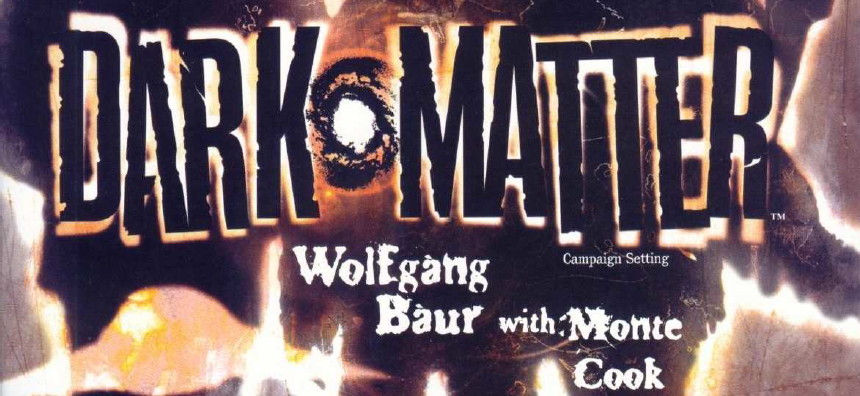 Chapter 8: Xenoforms - Mole Person thru Yeti 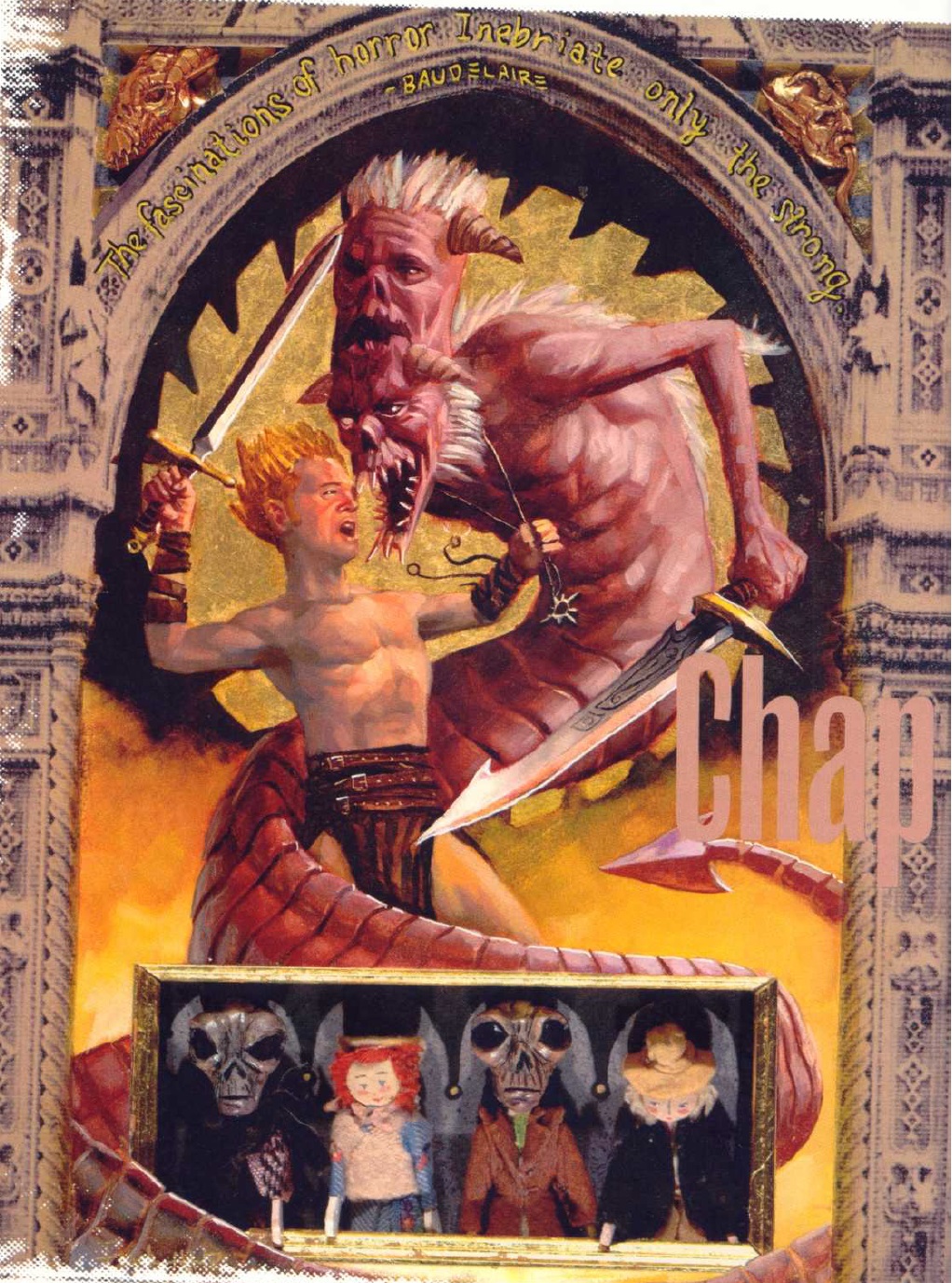 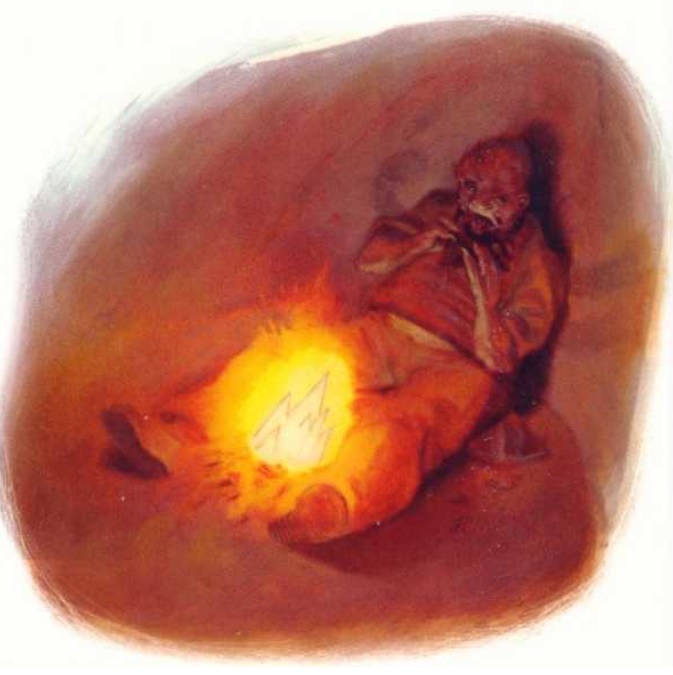 MOLE PERSON Description: They're a genetic offshoot of homo sapiens with an origin that nobody has yet uncovered. It's entirely possible they've only been around for a few hundred years and are just the result of intense inbreeding between marginalized people that got pushed further and further towards the fringes of society with the onset of the industrial revolution. Mole people are basically regular humans but with an aversion to light and an innate hatred of surface dwellers and a strong belief that some day they'll forge an empire that will overthrow the tyranny of the humans that dwell above them. Also they're known to kidnap children and/or runaways when they stage an excursion to the surface and the book says they raise these people as their own and that "children raised among the Mole People adapt well to their way of life" so it's unclear whether they're actually a different species from human beings or whether being raised underground morphs regular people into Mole People or what's going on. Also there's Newts, which are Mole People++ basically they've lived underground for so long that they've gained the ability to regenerate any amount of physical damage (short of something like complete submersion in acid). Supposedly their regenerative powers are so good that if you tore a Newt in half, both halves would regenerate into a full Newt so it's possible that all Newts are actually genetic copies of one unfortunate mutant that just got torn in half hundreds of times. My Take: Game-wise the Mole People and Newts are just stock humans with a few powerful mutations added from the core Alternity PHB. The setting fiction makes some uncomfortable implications about homelessness and marginalized groups when it theorizes about the origins of Mole People and I don't really want to get into it. It's the same tone-deaf writing you get with every RPG by cis-het white dudes that try to write about other cultures with which they have had no personal exposure. 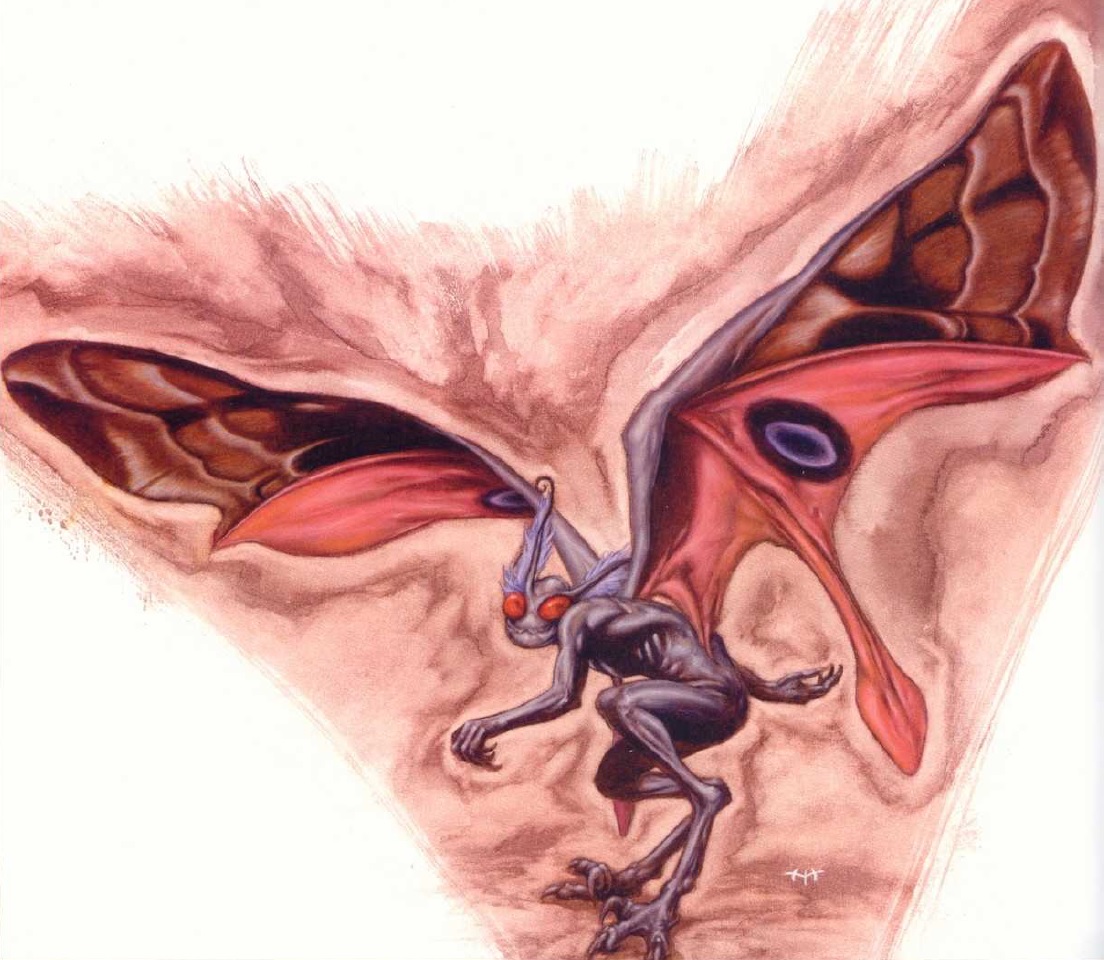 MOTHMAN Description: These things appear to be some combination of man and moth, but most interestingly they actually share the same genetic foundation (TPA) as the Greys - thus far, neither species has expressed interest the other, the Mothmen claim to be completely ignorant of the Greys, and the Greys refuse to answer any questions about shared ancestry (as they are wont to do). Mothmen have super hearing and super vision at night (although daylight blinds them) and they've got big wings so they can fly very well. Their primary social unit is the tribe or clan, and any Mothman incursions that have visited Earth have involved the entire group traveling to Earth - evidently they are nomadic hunters in their home dimension and more complex forms of social hierarchy have yet to occur. They've got an innate mastery of Shamanism FX and have proven willing to share their knowledge with humans that approach them on their terms. They prefer isolation to human contact, typically only reaching out to human for assistance when there is a threat so great that a tribe is unable to resolve the problem by itself. Their home dimension doesn't have technology much more advanced than our Bronze Age, and they're superstitious about contemporary human equipment. My Take: Other than their ability to fly and their enhanced senses, Mothmen aren't significantly different from a stock human. They have natural claw attacks that deal better damage than an unarmed human, but the fact that they refuse to use advanced technology put them at a significant disadvantage against prepared investigators. The innate Shamanism FX is a nice flavor piece but as we discussed in Chapter 4 the actual spells within Shamanism are mechanically lackluster and not really useful as monster-of-the-week powers. These feel like a "mandatory" inclusion for the X-Files lite setting and the one interesting hook (they might share a common ancestor with the Greys) is never mentioned or explored again. 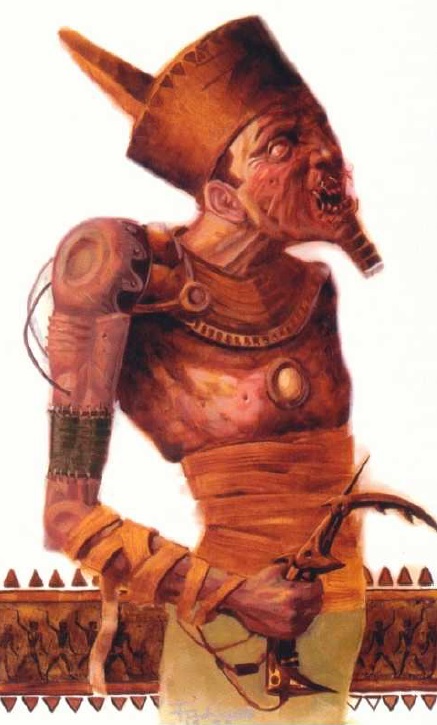 MUMMY Description: In Dark*Matter mummies are just animated corpse machines that function because of the Kinori fusion of science and the occult. They're low functioning, basically just serving as guards that can follow very short commands and only in the most literal terms possible. They don't have any occult powers of their own, they can't handle weapons that require more effort than "swing the sharp end into your target", they aren't especially durable, and they don'y retain any knowledge of their past life. They're basically golems from Dungeons and Dragons except made out of deceased corpses (so, flesh golems I guess). My Take: This whole entry has me asking "What's the point"? I would have guessed the mummies would retain some aspect of their prior knowledge or intelligence, but as-is they're basically just golems that can barely perform guard duty competently. I guess if you are in the market for completely loyal guards that don't require food or water and won't ever question your orders then mummies might be for you, but I don't really see these working as a central obstacle that players would have to overcome. Another entry like the Homunculus where it's more a piece of set dressing than a useful encounter. 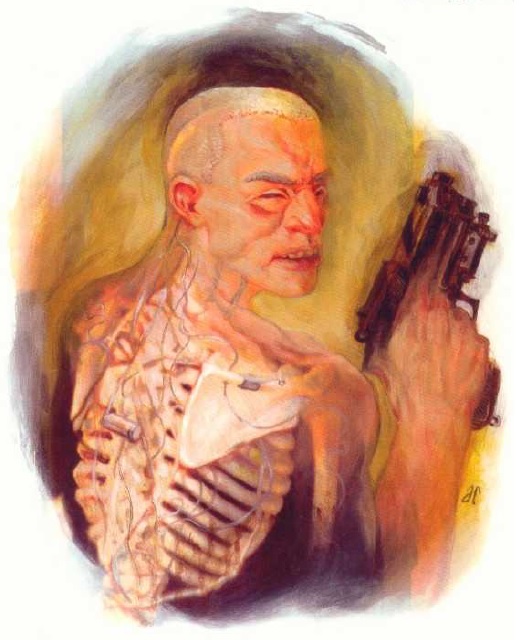 SANDMAN Description: A Sandman is a human being that's undergone the nanite metamorphosis process created by the Etoile. Completing this process turns the human into a hybrid organic and mechanical entity that is 100% loyal to the Etoile and will dutifully complete any tasks assigned. Sandmen aren't mindless though, they still retain all of the intelligence from their pre-transformation lives; instead they leverage their existing knowledge to help the Etoile accomplish whatever nefarious tasks they have in mind. Sandmen actually have a culture, in as much as any servitor race can, which is heavily influenced by military ideology, dogma and regimen. Often the Etoile will infect everyone in a remote location so that an entire town can turn into a loyal Sandman enclave. While nobody on Earth has yet managed to uncover what master plan the Etoile are angling for, Sandman activity seems hyper focused around probing human military installations; they're conducting an elaborate reconnaissance campaign of which Earth's governments are only dimly aware. My Take: Turns out I was wrong, there are rules provided for adding the Sandman template to a stock human, although allowing players to have a Sandman hero is strongly discouraged. I guess that could work fine if the GM wanted one of the players to be a secret Sandman traitor and the rest of the party wasn't supposed to know about it? They can integrate any extant human technology into their physical form, so most Sandmen have an array of weapons and gadgets and communications devices hidden in their bodies that they can utilize at a moment's notice. Mostly it feels like Bauer and Cook wanted to have The Thing as a monster in their campaign but needed to tweak it by 10% to avoid copyright infringement. 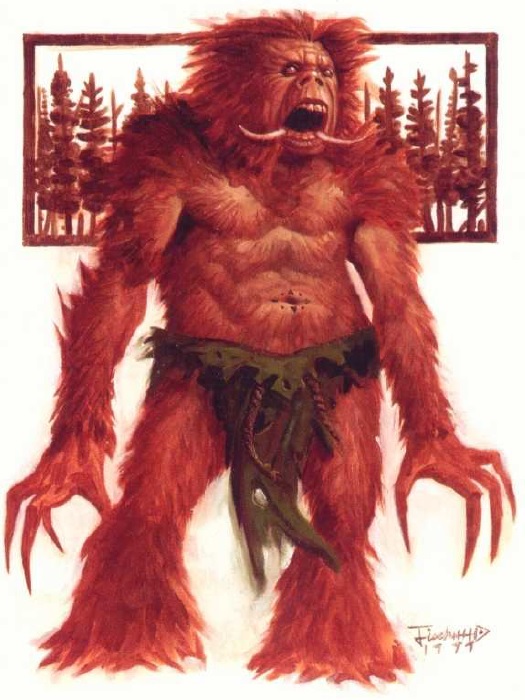  SASQUATCH & YETI Description: We covered the Sasquatch in their entry as a client species of the Greys in Chapter 6 and their inclusion here is basically just to provide the DM with a stat block in case they need to be used in the campaign. They're extremely similar to the Warren race from the Alternity PHB (physically dominant aliens that looks like a cross between a gorilla and a bear) and the only new addition in Chapter 8 is that they've apparently got their own school of Faith FX! It's based around battle chants and using your voice as a weapon, and of course only Sasquatch/Yetis can learn to use this skill. This dovetails nicely into the implication that Sasquatch/Yeti could be used as player characters provided the DM was willing to allow it. Oh also Yeti are identical to Sasquatch; they're what the race is called when they're encountered in Asia (in case that wasn't obvious). My Take: Sasquatch are more interesting to me if they're a one-off encounter or a monster-of-the-week thing or are otherwise an unknown force that the investigators have to overcome. Giving them a whole cultural identity around being refugees from the Greys is fine but I feel like it leans too hard into the "Noble Savage" cliche and all the stuff about their proud warrior culture makes me roll my eyes. If it was me I'd make them rare/unique but I guess the option is on the table either way. That wraps up Chapter 8! The next two chapters are extremely perfunctory. Chapter 9 is "How to be a GM" and is mostly stock-standard GM advice that you can find in any TTRPG ever printed; the only memorable nugget is when Bauer and Cook decide to tackle the question "What do you do when one of your players isn't cooperating with the rest of the group?" and their answer isn't "Speak to them like an adult, figure out why they aren't cooperating, see if any changes can be made, maybe cut them loose as a last resort" and instead they go straight to "Either kick them out immediately, or if the person in question is someone that you don't want to upset IRL, instead just make their character in the game suffer through an increasingly unpleasant series of mishaps and failures and fumbles until they quit on their own in frustration". Real top-notch advice there guys. Chapter 10 is "Alternate campaign options" which basically says that if the GM wants to let the investigators be Greys or Kinori or Sasquatch or etc. to just go for it. Neither of these chapters are particularly interesting, so I'm going to skip them. Instead, what I want to do is explore the two pre-made adventures that came in the book. The first one comes with a bunch of pre-made player characters and is fairly short (it takes place in a single location over the span of one night) and the second one is longer and could potentially lead into a campaign (if a GM was so inclined). I'm going to run the starter characters through the first adventure and the one(s) that survive will go on to the second. NEXT TIME: Raw Recruits and an Ice Cold Killer.
|
|
|
|
It's probably worth mentioning that adepts in UA3 are way more functional than they were in UA2.
|
|
|
|
I just can't think of why I'd want to play anyone but an Entropomancer who works for Mak Attak and rides skateboards into traffic.
|
|
|
|
The entropomancer was one of the best examples of gameplay and character integration, because it's addiction to taking risks or pulling stupid stunts can so easily become the player's. It's probably one of the most immersive adept styles since the players have just enough distance from the actual real-life of the character to find insane, life or death stunts tempting and the promise of a reward for just one more risk is very, very tempting. Play russian roulette, get a significant charge...all you have to do for a second significant charge is to spin that gun again and take another chance...you'll probably win. It's one of the most seductively self-destructive adepts out there.
|
|
|
|
Halloween Jack posted:I just can't think of why I'd want to play anyone but an Entropomancer who works for Mak Attak and rides skateboards into traffic. same except a guy that gets so drunk that he breaks the laws of space and time
|
|
|
|
7th Sea 2: The Crescent Empire - Lasers Are Magic In Ashur, only an Assassin may kill, because they have earned the right by dying many deaths. This right and these deaths are bound up into their mystical leather collars, and those who wear the collar and suffer the deaths also gain another power: Nawaru, the manipulation of light. Few in the Empire, let alone beyond, know of this magic. Those that do often find it odd that assassins would use light magic, and often they laugh at the tales of rooms plunged into utter darkness, shining weapons of light or perfect illusions only shattering with a touch. The Assassins say that without death, you cannot control light. They believe the power comes from the wisdom granted them by their repeated lives and deaths, which lets them tap into a higher plane of existence. It is said that with each knot in the collar, each life lived and died, they have the potential to learn a new turru, a new power of Nawaru. It is rarely seen as a gift, however, for each is earned by a hard, painful death recalled and relived. No sorcerer who has ever tried to learn Nawaru without a collar has ever succeeded - or survived the attempt. As noted, turrus of Nawaru are less 'learned' and more 'remembered.' Each knot represents a death, and each death is the potential to learn a new way to tap into the plane of eternal light that exists beyond life. Each remembrance is fundamentally tied to remembering and re-experiencing the life that grants wisdom and the death that took you to that place beyond time and space. Thus, each Assassin 'learns' turrus in a different order, and few young ones share the same powers. When you first purchase Sorcery (Nawaru), and every time thereafter except the fourth, you get one Minor Turru and one Major Turru. On the fourth purchase, you also get a single Advanced Turru, of which three exist. You may never have more than one of them. You should, on selecting a turru, note what life and death you experienced to remember it, and how the two are symbolically related, though you need not be detailed. To use a turru, you must spend a Hero Point. Minor or Major turrus may be used once per scene each, while an Advanced turru may be used only once per story arc. (Which is fine because they are all insanely powerful.) Minor Turrus Brilliant Bind: Activate this to throw a flash of light that blinds your chosen foes - and only them. All blinded foes roll 2 fewer dice on all Risks. This lasts for (number of Sorcery purchases) rounds. Cloak of Unseen Resplendence: Activate this to bend light around yourself, becoming invisible. Touching people, leaving footprints or moving things can still reveal you, but you remain invisible until you either release the spell or are knocked out. Attacking someone or taking Wounds also ends the effect immediately, but speaking, touching people or picking things up do not. Cover of Darkness: Activate this to draw all light in a room (or in a small area centered on you, if outdoors) into yourself. Candles go out, fires are snuffed, even the sun dims. This lasts until the first of you releasing it, you leaving the area or the Scene ending. Glowing Gate: Activate this to teleport through beams of light, transporting yourself from one patch of light to any other in line of sight. (This works best if there are shadows to differentiate different areas - high noon with no shade is a bit tricky, because it's all one patch.) Guardian's Peace: Activate this to touch someone and give them a sense of calm and peace. ...yeah, that's it. You make one person calm. (It is mostly used to grant some peace to victims just before you kill them.) Heaven's Flame: Activate this to summon a flame that gives off light and heat as a normal fire, but cannot be extinguished as long as you remain in the area. When you leave, either the fire goes out or continues to burn for (Sorcery purchases) rounds afterwards, your choice. Light in the Shadows: You summon enough ambient light to brighten a room or illuminate your immediate area. It cannot be extinguished by any means. This ends either when you release it or at the end of the Scene, whichever comes first. Spark of Intuition: Activate this to tap into otherworldly wisdom. You may ask a single simple question, such as 'am I on the right track' or 'should we follow that ship' or 'does this person deserve to die?' You receive a definite answer in the form of a sign, omen or sense of certainty. If the outcome of your question is debatable or uncertain, the answer is based on your agenda or desires; if there is a definitive, objective answer, it is based on truth. Major Turrus Blazing Purge: Activate this to set an area ten feet in diameter or smaller alight with holy (and largely harmless) flame. Any disease or taint is cleansed from the area temporarily, and Monsters in it take 4 Wounds immediately, plus 1 Wound for each action they take while in the area afterwards. Any blight, disease or uncleanliness is rendered harmless as long as the fire remains. This lasts until the end of the scene. Blessing of Bright Tranquility: Activate this to calm a large crowd centered on you. Rioters became merely irritated and upset, fearful people become calm. This lasts for as long as you stay in the crowd, and for (Panache) rounds after you leave. Dawning Revelation: Activate this to call on the power of the world beyond to learn one major piece of necessary information to aid you in your current situation. What you get will always be useful, but you have no control whatsoever over what information is revealed. Glittering Mirage: Activate this to make perfect illusions of anything you are familiar with, including copies of yourself. Illusions last until physically interacted with or you order them to vanish, and you may maintain up to (Wits) separate illusions at once. Guardian's Dart: Activate this to fire a laser at someone or something. If aimed at a character, they take (Finesse) Wounds. At an object, anything of handheld size or anything particularly fragile is instantly destroyed, while larger or tougher objects, such as wagons, statues or buildings, are partially destroyed and rendered unusable or unsafe. Radiant Retribution: Activate this to make a small bomb of light energy which you can place or throw. The bomb does (Brawn+2) Wounds to anyone caught in its blast and will destroy most objects of wood, stone or weaker materials in a ten foot radius. You may have it explode immediately, or delay it for up to (Sorcery purchases) actions. Stutter Step: Activate this when you would take Wounds. You evade by moving as fast as light for a single instant, preventing all Wounds from the attack. Veil of Brilliance: Activate this to call down a veil of light as a wall up to 20 feet high and high or as a sphere of up to 10 foot diameter, to shield all behind or within it from attacks. It may absorb (Resolve+Sorcery purchases) Wounds before it breaks. Advanced Turrus Brilliant Illumination: Activate this to send your consciousness to the plane beyond, giving you understanding. Have a discussion with the GM about what you want to know, what you want to do and how your actions may affect your future and the world at large. This should give you an understanding of your actions and your possible options for steps to take next or future plans to make. Form of Splendor: Activate this to turn your body into pure white light. Any poison or illness within you is immediately purged, and you cannot take Wounds in this form. You may choose either to harm or not harm anyone you touch. If you choose to harm, your touch causes 2 Wounds per Raise you spend. You may not change your decision while the power is active, and it lasts until the end of the round. Wrath of the Heavens: Activate this to call down a massive laser, obliterating everything in a circle of 50 foot radius centered on a spot you choose. Nothing within the blast is left but smoking earth. You cannot make the blast smaller. Next time: Mass Combat
|
|
|
|
Mors Rattus posted:7th Sea 2: The Crescent Empire - Lasers Are Magic. So, now that we've covered it, I can talk about this I loving hate Ashur. I hate literally everything to do with it. I hate its fluff, I hate its mechanics and I Reeeeeeaaaaallllllyyy hate it's magic. I get why it's there. They had been playing assassins creed. I don't get the Lasers but whatever. But everything feels like it should be in a more high powered, more traditional fantasy game. Their leader is the immortal boy sage, who is capable of making people into super cool light bending assassins who also has access to the almost literal garden of Eden. Their magic gets three tiers, which includes the loving Low Orbit Ion Cannon. Sure they can use it only once a story but that's still access to the Low Orbit Ion Cannon. I know I'm not being super coherent but just... My eyes slide off anything to do with Ashur because it's just completely dull to me
|
|
|
|

|
| # ? Apr 19, 2024 01:16 |
|
I think having a group that represents the Coptic and Miaphysite Christians in the same way the Vaticine is Catholics is important, and having the Anashid take the place of the Nizari Ismaili is...a choice, certainly, and not a terrible one. Having Assassins fits because Alamut was a real place that had real Nizari fanatics trained to lie or kill to defend the Ismaili. I even like the religions represented in Ashur and I love the Orthodox doctrine and the take on Jesus they went with. But how the Assassins themselves got put together and their magic laser powers, well, that could have been done better.
|
|
|

